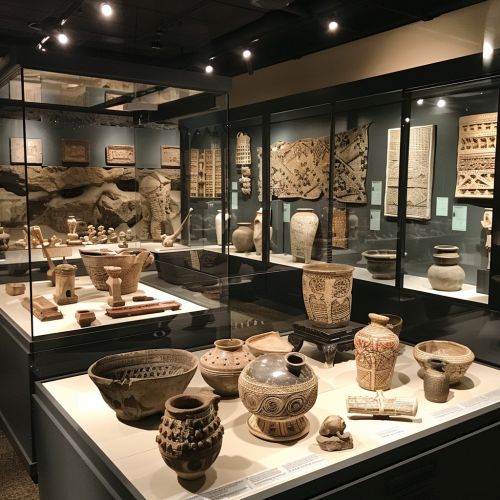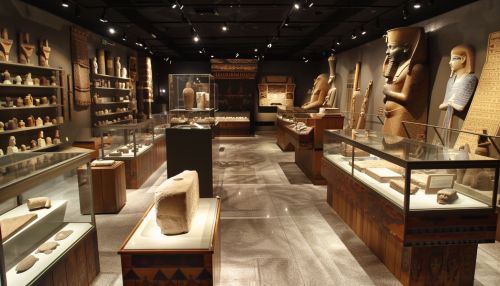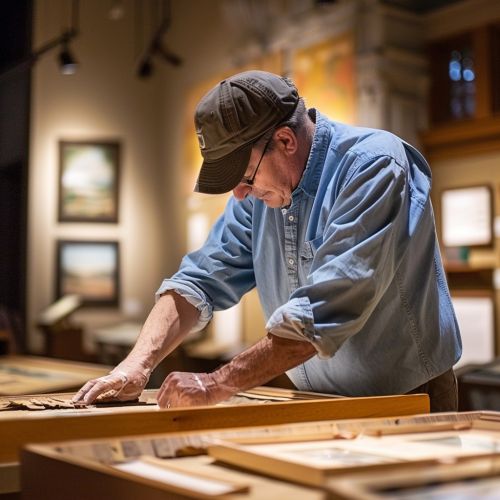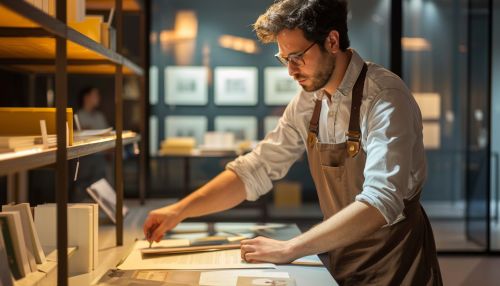Museum Studies
Introduction
Museum studies, also known as museology, is the study of museums and how they have established and developed in their role as an educational mechanism under social and political pressures. The field of Museum Studies encompasses the practical and theoretical aspects of collecting, preserving, presenting, and interpreting objects and specimens for the public.
History of Museum Studies
The field of museum studies has a long and varied history, beginning with the establishment of the first museums in ancient civilizations. The ancient Greeks and Romans collected and displayed objects of art, nature, and history in temples and public spaces. These early collections were precursors to modern museums and were often used for educational and cultural purposes.


In the Middle Ages, collections of artifacts were often held by the church or by wealthy individuals. These collections were known as "cabinets of curiosities" and were precursors to the modern museum. The Enlightenment period saw the establishment of the first public museums, such as the British Museum and the Louvre Museum, which were designed to educate the public and promote national identity.
The study of museums as institutions and the development of museum studies as a discipline began in the late 19th and early 20th centuries. This was a period of great change in the museum world, with the establishment of many new museums and the development of new methods of display and interpretation.
Theoretical Frameworks in Museum Studies
Museum studies is a multidisciplinary field, drawing on theories and methods from a range of disciplines including anthropology, history, sociology, art history, and education. Theoretical frameworks in museum studies can be broadly divided into three categories: institutional, visitor-centered, and critical.
Institutional Theories
Institutional theories focus on the museum as an institution, its roles and functions in society, and the ways in which it operates. These theories often draw on organizational theory and sociology, looking at the ways in which museums are structured and managed, and the relationships between museums and other institutions.
Visitor-Centered Theories
Visitor-centered theories focus on the experiences of museum visitors. These theories draw on psychology, education, and communication studies, looking at how visitors interact with museum exhibits, what they learn from their visits, and how museums can enhance visitor experiences.
Critical Theories
Critical theories in museum studies challenge traditional assumptions about museums and their role in society. These theories draw on critical theory, cultural studies, and postcolonial studies, examining issues such as the representation of marginalized groups in museums, the role of museums in perpetuating colonial narratives, and the ways in which museums can contribute to social justice.
Museum Practices
Museum practices refer to the methods and techniques used by museums to fulfill their missions. These practices include collection management, exhibition development, educational programming, and community engagement.
Collection Management
Collection management involves the acquisition, documentation, preservation, and deaccessioning of objects and specimens in a museum's collection. This process requires a deep understanding of the museum's mission and collection policy, as well as knowledge of legal and ethical issues related to collecting.
Exhibition Development
Exhibition development involves the planning, design, fabrication, installation, and evaluation of museum exhibits. This process requires a combination of creative and analytical skills, as well as knowledge of visitor behavior and learning theories.
Educational Programming
Educational programming involves the development and delivery of educational programs and resources for various audiences, including school groups, families, and adults. This process requires knowledge of learning theories and educational practices, as well as the ability to communicate effectively with diverse audiences.
Community Engagement
Community engagement involves building relationships with local communities and stakeholders, and involving them in the museum's work. This process requires strong communication and interpersonal skills, as well as a commitment to inclusivity and social justice.


Museum Studies Education
Museum studies education provides the theoretical knowledge and practical skills needed to work in the museum sector. This education can be obtained through undergraduate and postgraduate programs, as well as through professional development courses and workshops.
Undergraduate Programs
Undergraduate programs in museum studies provide a broad introduction to the field, covering topics such as museum history, theory, and practice. These programs often include practical components, such as internships or project work, which provide students with hands-on experience in the museum sector.
Postgraduate Programs
Postgraduate programs in museum studies provide more specialized knowledge and skills. These programs often focus on a particular area of museum practice, such as collection management or exhibition development, and may include research components.
Professional Development
Professional development in museum studies can take many forms, including workshops, conferences, and online courses. These opportunities allow museum professionals to keep up to date with the latest developments in the field and to network with colleagues.
Future of Museum Studies
The future of museum studies is likely to be shaped by a number of key trends and challenges. These include the increasing use of digital technology in museums, the need for greater diversity and inclusivity in the museum sector, and the impact of global issues such as climate change on museum practice.
Digital Technology
Digital technology is transforming the way museums operate and engage with their audiences. From online collections and virtual tours to interactive exhibits and social media, digital technology offers new ways for museums to fulfill their missions. This trend is likely to continue, with ongoing advances in technology offering new possibilities for museum practice.
Diversity and Inclusivity
The need for greater diversity and inclusivity in the museum sector is a key challenge for the future. This includes diversity in terms of the staff and volunteers who work in museums, the audiences who visit them, and the stories and perspectives that are represented in museum exhibits and programs.
Global Issues
Global issues such as climate change, migration, and social inequality are increasingly relevant to museum practice. Museums have a role to play in raising awareness of these issues, promoting understanding and action, and contributing to sustainable development.
